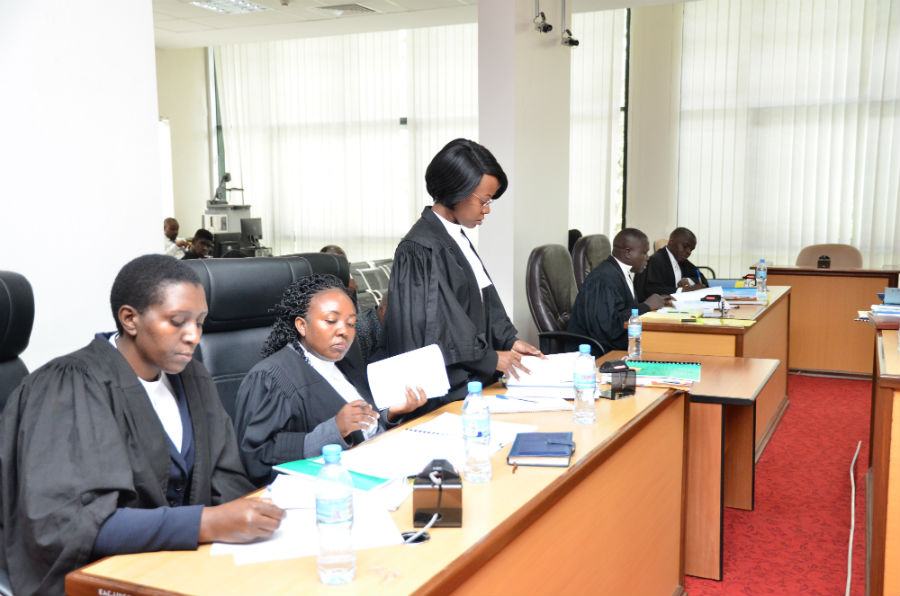
Court hears case challenging the Constitutional Court of Uganda
East African Court of Justice, Arusha, Tanzania, 1st November, 2019: The First Instance Division Thursday heard case Reference No. 8 of 2018, a matter challenging the Constitutional Court of Uganda for an inordinate delay in delivering justice in a criminal case. The case which was filed by Hassan Bassajabalaba and Bassajabalaba Muzamiru, (Applicants) who are both Ugandans versus the Attorney General of the Republic of Uganda sued on behalf of the Government of Uganda.
The Applicants are seeking a permanent injunction restraining the Government of Uganda, its agents or persons claiming through it from re-instating prosecution of the Applicants, and staying all criminal charges and proceedings against the Applicants.
The Applicants represented by Mr. Caleb Baraka in court submitted that, under the EAC Treaty, the Republic of Uganda has an obligation to uphold the fundamental and operational Principles stated in Article 6 [d] of the EAC Treaty. He submitted that through the acts and/or omissions of its organs, agents and bodies, said provisions have been violated as far as the Rule of Law is concerned and that the Applicants approached the Court in order to be vindicated according to the Rule of Law. The Supreme Court of Uganda does not have jurisdiction to interpret Article 6 [d] of the Treaty and does not fall in line with this Court’s mandate.
The Applicant further submitted that in the context of the Treaty, if the Court finds that the Treaty has been violated, it shall have the authority to make a determination binding the Supreme Court and all its organs in the Republic of Uganda as a Partner State. He further argued that if a state in itself fails to abide by its own laws, then the regional Court can observe the domestic.
The Respondent represented by Ms. Patricia Mutesi, submitted that the representation of the case (Reference) requires the Court to make a determination. It was her contention that the orders of the Constitutional Court cannot be struck out without determining the petition placed before it, which would amount to Appellate jurisdiction over the Constitutional Court. Mutesi also said that one of the criteria for Appellate jurisdiction is the authority to undo determinations of law. In order to change the determination, it would first mean to establish whether the Constitutional Court is willing to salvage the law.
She further argued that advocating to stay proceedings in the Supreme Court would only serve to halt determining a remedy to the issue. That If an appeal has been raised to the Supreme Court for a remedy, ideally the Court should allow the domestic process, giving the chance to remedy the conduct which is complained upon. She added that it may raise an issue as considered premature when all possible solutions have not been exhausted.
The parties asked court to adopt their written submission without going into highlighting on all the issues raised in the case.
The Court will deliver the judgment on notice to the parties.
The bench for the First Instance Division was composed of Honourable Justices: Lady Justice Monica Mugenyi (Principal Judge), Justice Dr. Faustin Ntezilyayo (Deputy Principal Judge), Justice Audace Ngiye, Justice Dr. Charles Nyawello and Justice Charles Nyachae.
Appearing for the applicants were Lawyers Kaleb Alaka and Kyazze Joseph, while for the Attorney General of Uganda were Ms. Mutesi, Charity Nabasa and Goreti Arinaitwe.
-ENDS-
For more information, please contact:
Yufnalis Okubo
Registrar
East African Court of Justice
Arusha, Tanzania
Tel: +255 27 2162149
mail: Okubo [at] eachq.org
www.eacj.org
About the East African Court of Justice:
The East African Court of Justice (EACJ or ‘the Court’), is one of the organs of the East African Community established under Article 9 of the Treaty for the Establishment of the East African Community. Established in November 2001, the Court’s major responsibility is to ensure the adherence to law in the interpretation and application of and compliance with the EAC Treaty.
Arusha is the temporary seat of the Court until the Summit determines its permanent seat. The Court’s sub-registries are located in the respective National Courts in the Partner States.
Tags: EACJ
